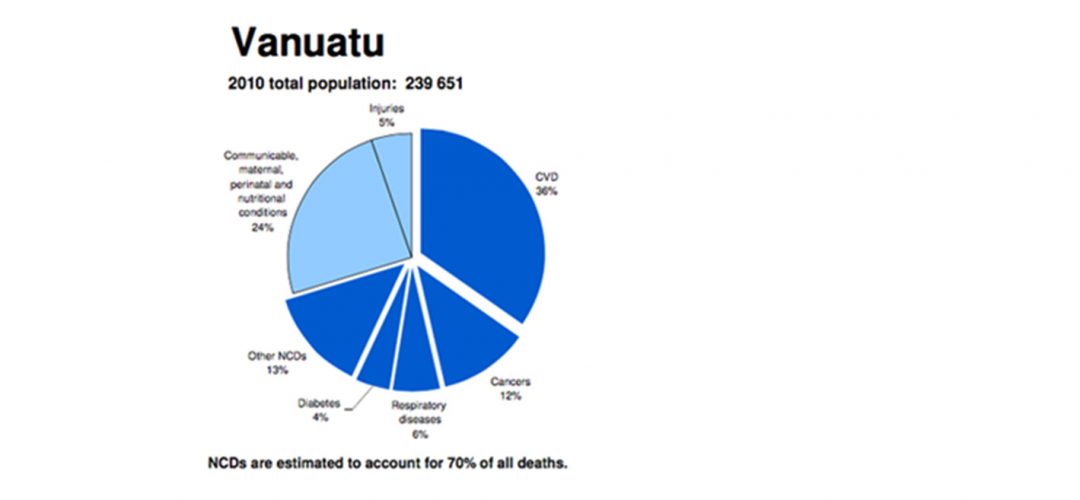Vanuatu Struggles in War Against NCDs

By Matthew Walter

Mrs Poilapa lives on after one of her legs was amputated 10 years ago. Photo by Jean Noel Anis
Vanuatu along with other Pacific nations who are struggling to hold their grounds against Non-Communicable Diseases (NCDs).
The general population of the 83 islands in the archipelago of Vanuatu have continued to suffer from non-communicable diseases such as obesity, heart and lung failure, stroke, cancer and diabetes.
Leimujia Poilapa (60), a mother of three children is one those victims.
Hailing from Mele Village in the island of Efate, Mrs Poilapa was a normal person like other people in her village.
She does home chores and gardening to sustain her family.
She was happy and healthy until she got a shock of her life when she was diagnosed by doctors at the age of 50 for diabetes.
She underwent surgery and one of her legs was amputated by surgeons at the Port Vila Central hospital.
“That was the biggest regret of my life to lose one of my legs,” she said.
Mrs Poilapa said the thoughts that came into her mind after her leg was removed was dying at an early age.
Despite the setbacks, Mrs Poilapa’s strong mind-set has seen her continue to enjoy normal life for the past 10 years after she was diagnosed for diabetes in 2007.
“I look after myself by taking medications such as consuming insulin twice a day and eating the right kind of healthy food,” she said.
Mrs Poilapa said her wish is to have more years to live.
She said people need to realise the consequences of non-communicable diseases and look after their health.
“We need to look after our young generation and encourage them to do regular physical exercise and discourage then of consuming imported foods that are sold in shops.”
The authorities through the Vanuatu Ministry of Health and non-government organisations and the private sectors are working around the clock to address the issue.
The Vanuatu government have developed policies on the prevention and control strategies of NCDs in Vanuatu.
The World Health Organisation report published in 2013 on NCDs in Vanuatu found that 70% of the deaths and disabilities in Vanuatu are caused by non-communicable diseases like cardiovascular diseases, diabetes, cancer and chronic respiratory diseases.
It was also stated in the report that the lack of physical exercises, high level consumption of imported food, cigarettes and alcohol are some of the major contributors to the rise of NCDs in Vanuatu.
Men have been found to be high consumers of alcohol and cigarettes while women have a higher rate of obesity due to insufficient physical exercise.
The World Bank reports of 2013 indicated that Vanuatu is ranked amongst the 12 island countries in the Western Pacific Region with higher cases of NCDs.
‘The economic costs of Non-Communicable Diseases in the Pacific Islands: a rapid stocktake of the situation in Samoa, Tonga and Vanuatu,” the report stated.
The report also stated that non communicable diseases are piling a lot of financial burden on the Vanuatu Ministry of Health and Ministry of Finance.
“Glucose testing strips for a diabetes patient may cost only US$ 0.45 cents per day in Vanuatu. But used every day, as is required, this amounts to US$ 164 per patient per year, more than the total government expenditure on health per capita,” the report stated.

Vanuatu Government leads campaign against NCDs in encouraging consumption of local products
The Acting Principal Nursing Officer at the Vanuatu College of Nursing Education, Mr John Tasserei said the NCDs have placed an enormous financial burden on families.
“It affects individual, families, communities and also impacts on the national economy and the developments,” he said.
He said the increase of non-communicable diseases in Vanuatu is growing at an alarming rate with 174 new cases recorded each week at the Port Vila Central Hospital.
Mr Tasserei said while NCDs are life time diseases, it is still preventable if people take the right actions.
He said the next national survey on NCDs will be conducted in 2018.
While, NCDs are seen to be self-inflicted disease, Vanuatu criminologist, Mr Jean Maurice Aite who is currently pursuing his masters in criminologist at the University of Victory in Wellington, New Zealand said NCDs is a crime.
He said overseas factories that are producing food with high level of chemical such as Monosodium Glutamate (MSG) are the main perpetrators of NCDS.
“NCDs is a form of cooperate crime because Vanuatu Government and food companies intersect to import food stuff even though they know that the general population are suffering from NCDs,” he said.
Mr Aite said people in Vanuatu must consume organic food instead of depending on imported products which are full of MSG chemicals.
The Editor of popular news website, Vanuatudigest.com, Nick Howlett said it is important to create a culture that values physical exercise.
“Increase funding for organised team sports for example aquatic centres, encourage students to learn to swim, surf and sailing,” he said.
He also said it is very important to educate school age children about proper nutrition.











No Comments
No comments yet. You should be kind and add one!